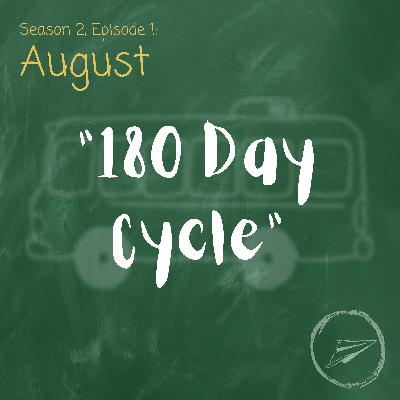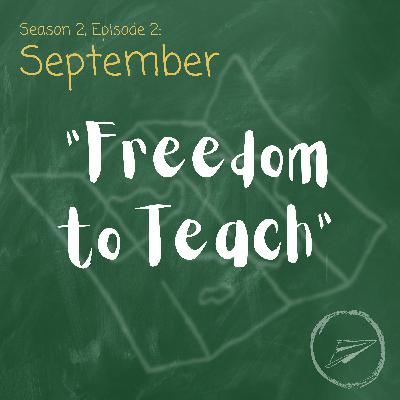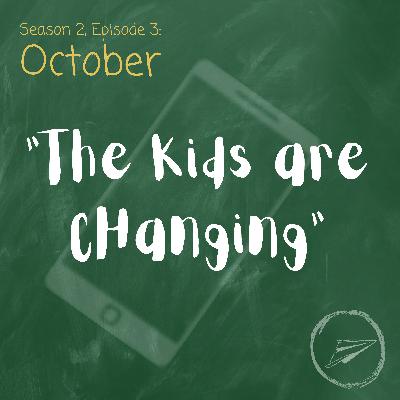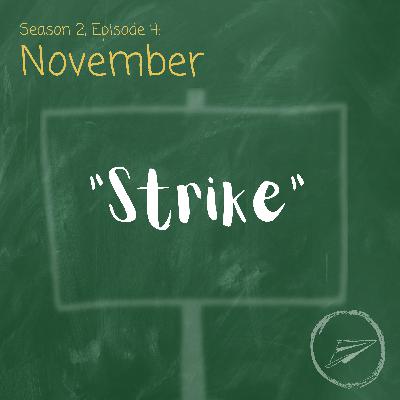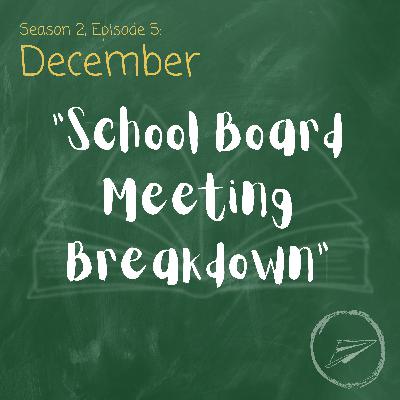5: Education has a Tourist Problem
Description
Imagine that you are hiring a new English teacher. None of the people who apply have any of the qualifications to teach English. No teaching degree. No English degree. No experience in the classroom. Would you hire any of them? Probably not. Now here is the irony. Many of the people making curricular and legislative decisions about education don’t have the qualifications to be hired within education. This is a problem. In this episode, we hear how standardization, high-stakes testing, and policy decisions made by non-educators may be contributing to teachers’ decisions to leave education.
Music:
Theme Song By Julian Saporiti
“So Stark (You’re a Skyscraper” by Matt LeGroulx is licensed under a CC BY-NC-SA license.
“Cat and Mouse” by Scott Holmes Music is licensed under a CC BY license.
“Space (Outro)” by Andy Cohen is licensed under a CC BY license.
“Home Fire” by Nul Tiel Records is licensed under a CC BY-NC-SA license.
“Press Conference” by Blanket Music is licensed under a CC BY-NC license.
“Things Change” by HoliznaCC0 is in the Public Domain.
“Living Life” by Scott Holmes Music is licensed under a CC BY-NC license.
“Boulevard St Germain” by Jahzzar is licensed under a CC BY-SA license.
“Hungaria” by Latche Swing is licensed under a CC BY-NC-SA license.
“Business Getaway ” by Scott Holmes Music is licensed under a CC BY license.
Transcript:
I used to listen to the Dixie Chicks’s song “Wide Open Spaces” before wrestling matches because I would get too wound up. It helped me slow down my breathing and relax.
In junior high and high school, I was fixated on winning and losing. I’d get a pit in my stomach, psyche myself up and out, all to my detriment. I was terrified of failing, of being a disappointment or an embarrassment.
Then I went to college. I walked-on to the University of Wyoming’s wrestling team. During my meeting with Steve Suder, the head coach, he told me, “You know, you’ll be walking into a room with a bunch of state champs. Are you worried about that?” I told him, “No, I’m not” because those were the guys that I wanted to be wrestling against. I was a two-time state placer and I had nothing to lose. Suder said, “Good,” and then told me that he never won state either, but he ended up being an All-American for the University of Wyoming, so there was hope for me.
During our conversation, in between adjusting this chewed up yellow cushion he used as a back support, he told me that I was like the pretty girl’s funny friend at a party. I’m not someone he noticed right off the bat, but once he got to know me, he was happy to have me around. He meant this in the best way possible, and I didn’t mind.
I made the team, worked my butt off, won some matches, and lost more than I won. And I hate losing, but it felt different. I was excited to be wrestling, not nervous. Suder made it clear that his expectations were low, but he was happy to have me. I focused on gaining experience and the process and growing as a wrestler and a person. And I got to wrestle a guy named Brent Metcalf, who is the only person I wrestled that had a documentary made about him. When someone asked Metcalf why he didn’t celebrate wins, he said, “I don't want to give my opponent the satisfaction of watching me celebrate, which would make it look like a big deal that I beat him.” This dude is a monster.
It was an extraordinarily humbling match. I had no control of my own body - his fingers were in my mouth at one point, but I learned what it was like to wrestle the best. It was eye-opening.
My tenure as a collegiate wrestler only lasted that year,but I remained in contact with Coach Suder off and on until his passing in 2019. And I had changed. My priorities shifted from valuing product to process.
When I became an assistant high school wrestling coach, the head coach had also wrestled for Coach Suder, and so we continued his tradition of emphasizing process. And what I noticed is that the wrestlers felt less pressure. They only tried being better today than they were yesterday. And when they have that mindset, success, though not guaranteed, is more likely. They are wrestling to compete and to score points. And even if they don’t have success, they do the best they can do at that moment, and that’s always worth being proud of.
In education, we focus on the product, on assessment. There is an obsession with passing or failing and we seem to have forgotten the value of process, which is where many teachers live. So today, we are going to look at how a structure of education that values standardized assessments could be contributing to teachers deciding to leave the profession, and because some of the frustrations with standardized assessment is a federal issue, which is too much to address here, we’ll explore a possible solution to the high stakes assessment issue in Wyoming, which would hopefully keep teachers in education.
This is Those Who Can’t Teach Anymore, a 7-part podcast series exploring why teachers are leaving education and what can be done to stop the exodus. I’m Charles Fournier.
Here is part 5: “Education has a Tourist Problem”
Mark Perkins: I do think that for a lot of teachers who are leaving, and this is speculative, but I think it's reasonable to assume that if you alleviated some of the assessment requirements within their schools, their satisfaction would increase. I don't think that that's a jump.
This is Mark Perkins, he is an Assistant Professor of Education Research Methods at the University of Wyoming and he is talking about the survey results he gathered about teacher attrition in Wyoming. So many teachers, both teachers leaving and teachers staying, reported that they were not happy with assessments.
As we’ve heard from teachers that left teaching, there wasn’t one thing that pushed them out of teaching. It was the layering of factors. And if we want to keep more teachers from leaving, it would be worth trying to address some of the most consistent factors. Aside from overall well-being and feeling supported, assessment is one the most consistent teacher frustrations.
Now before we get into what specifically teachers don’t like about assessment, I think it’s important to think about why education currently has assessments, and this goes back to what we talked about last episode: the purpose of education and needing to be able to measure success for whatever that purpose is. Simply put, we need to reflect on what we want kids to know and how we can measure what they know. Mark explains.
Mark Perkins: And so what does school success really look like? That sounds like an interesting, easy question. It's like, Well, kids know how to do math. Well, okay. What does that look like? Well, they can add, subtract, divide. All right. So what? When you start drilling into the actual requirements to exist and inhabit the world, the factors become much more latent than what we measure. But we fixated ourselves purely on content.
During our conversation, Mark explained that there are a ton of other things that we want for students: self-awareness, identity development, civic consciousness, the ability to have some gumption and as Mark phrased it, drag a horse through the mud. But none of those qualities are easy to measure, which means it’s more difficult to measure a teacher’s overall effectiveness. This brings us back to the focus on content.
Mark Perkins: But all of the focus has been on reading math, science and somewhat government. How does a teacher who navigates let's call it the multivariate universe of being an educator. How do you evaluate teaching for the holistic aspects of the job? While we don't?
It would be difficult to assess students and teachers in the Multivariate Universe of education, as Mark puts it, so we assess a few content areas, and only a few things in those content areas. Many mission statements want to acknowledge the whole student, but we only assess a fraction of the s





